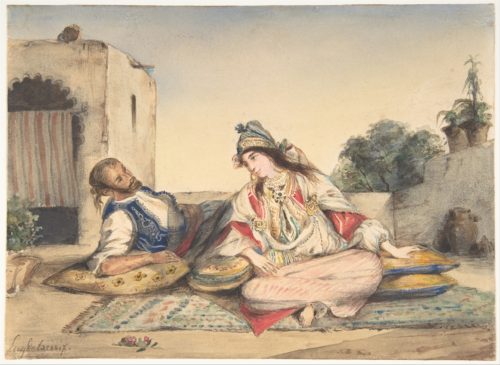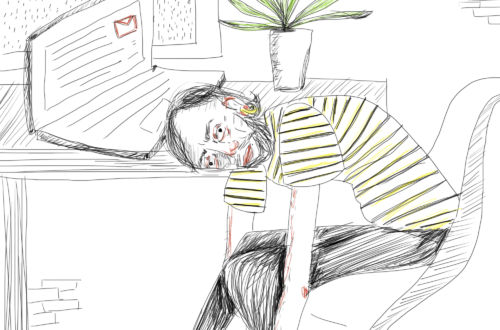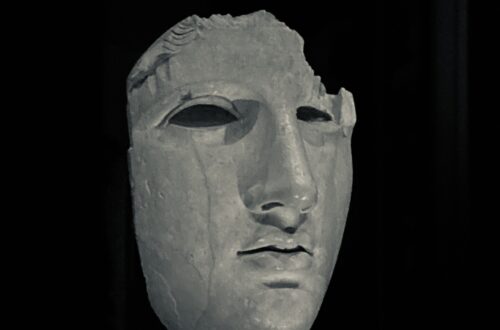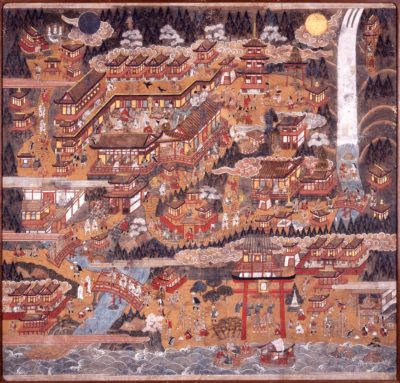
“Artemis” by Peter Warzel
The old dreams of hunting, the moon. Deep in the blood, memories of poets and kings asking for and receiving stories of the first and the last. The sanctuaries of Artemis are spread throughout the groves of the Mediterranean and she shape-changes by location. She, Artemis Diana, had come here, to my backyard.
On a Friday evening two years ago, the night of Zozobra burning when I refused to attend but could hear the groaning from Fort Marcy Park and the annoyance of the helicopters keeping order on the crowd, I was standing in the yard having a cigar and a beer and called my son Zach to remind him of the annual auto-da-fe, and he chanted into the phone “Burn him, burn him.” We rang-off and I turned to go back into the kitchen when the last light caught a magnificent sight strung from the support beam of the door overhang to the chair stile next to the door to the tree trunk at the fence. The web was illuminated, what must have been six or eight square feet of it, and at the top sat Diana, still and ready.
So I named her and I sometimes spoke to her. She was a companion for several months, not quite a pet, but only after I read that she was not dangerous, carried venom that was not very toxic. She did not need to read about me as she was from the first uncowed, elegant, disdainful of my presence. Diana was a cat-face spider, a jewel spider, Araneus gemmoides, and she was big. It is odd that she did not instill the chill fear in me that most spiders do. Perhaps because she was a known quantity in place, not something dropping out of the sky onto my arm. But, she was fearsome, a hunter of incredible speed and efficiency. Hence Diana, my girl. Artemis transformed.
Diana was an orb weaver and her bulbous abdomen spun quickly and not so precisely, but able and adequate for her intended purpose. Her web was more a net than a fine-laced weaving. It was utilitarian and deadly, not elegant. It was huge, concentric, vertical, built for quantity of prey like a shore fisher would do casting for numbers not throwing a fly for individual proportions and bragging rights.
Every evening and morning I would go out the door to check on Diana. Usually things were still, she immovable at the top of the web. When a fly or bee or moth hit the net the vibration would trigger an alarm and Diana would move at light speed down the ladder of the radials to the catch, spin it in a “cocoon,” wrapping the corpse. The action was quick and fearsome and stunning to see. This gentle weaver was a killer, a predator of an elite class. Later I would notice that the mummy was gone, devoured, feeding the cycle that would end in winter.
We had a strong late summer storm and in the morning the web was damaged, disconnected from the chair and flapping in the wind, a large gap just south of center in the design. I worried for Diana. That evening, home from work, I went in the yard and the web was whole, perhaps a bit less elegant but rebuilt in total and set for whatever might get fatally stuck. I was impressed, truly, that this odd neighbor would take matters in hand so quickly and completely and rebuild her world efficiently. I think though, she became exhausted by the effort for I did not see her move for several days. I did return one evening to find her at work repairing a disruption in the right center of the web, and stood watching her weave, the front legs working like knitting needles, spacing the fix, she allowing me the view unconcerned about my presence two feet away. I took photographs as darkness came and in the flash of the camera the fine hairs (trichobothria) on Diana’s legs stand out in profile, the beauty of this beast a surprising revelation to me. An evolutionary fear had become something else, the beginning of an understanding.
When fall came she worked her way up into the corner of the roof overhang and got busy propagating that evolution. She tucked her egg sack up under cover for the winter to come and as the autumn went on she stayed at the sack, the web beginning to disintegrate below her and she not inclined to reweave the damage. I noticed then a leaf covering the sack one day and she moving it gently as if to camouflage the hoard. It was a deliberate hiding and it startled me. Certainly the action was all instinct and I did not humanize it, yet it was a reminder of the role we play in bringing new life into this world. When our own instilled species memories go awry, the world goes out of balance and it all becomes difficult.
I watched Diana waste away, still guarding the hoard. In the spring, wintered over, I waited for the day the spiders would come from that protected sack and spirit away on fine threads to populate the neighborhood. It did not happen, or I missed it. So I awaited the return of the hummingbirds for companionship.
Observation keeps me whole.
*
Peter Warzel has published short fiction, poetry, essays and articles in newspapers, literary journals, and national magazines, including Gray’s Sporting Journal, New Mexico Magazine, Zone3, Pilgrimage, Inside/Outside, and Cowboys and Indians Magazine. He was the Books Editor for The Montana Quarterly for many years and has published over 300 reviews over the years.




